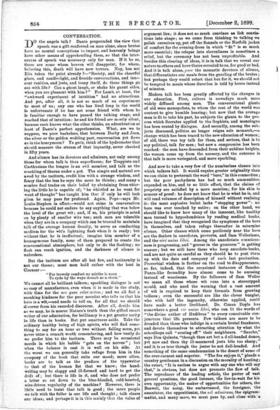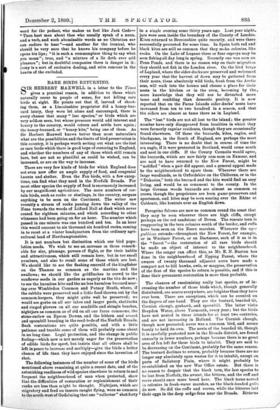CONVERSATION.
DO the angels talk ? Dante propounded the view that speech was a gift conferred on man alone, since brutes have no mental conceptions to impart, and heavenly beings have other means of apprehending them, so that the inter- course of speech was necessary only for man. If it be so, there are some whom heaven will disappoint, for whom, believing this, death will have new terrors. Nay, has not Elia taken the point already ?—" Society, and the cheerful glass, and candle-light, and fireside conversations, and inno- cent vanities, and jests, and irony itself, do these things go out with life ? Can a ghost laugh, or shake his gaunt sides, when you are pleasant with him ? " For Lamb, at least, the "awkward experiment of intuition" had no attractions. And yet, after all, it is not so much of an experiment to most of us ; any one who has lived long in the world is unfortunate if he has not some friend with whom he is familiar enough to have passed the talking stage, and reached that of intuition: he and his friend are mostly silent, because each knows what the other thinks, an adumbration at least of Dante's perfect apprehension. What, are we to
suppose, we poor bachelors, that between Darby and Joan, the silver or the golden wedding past, conversation yet flows as in the honeymoon? Ye gods, think of the hydrometer that should measure the stream of that loquacity, never checked in fifty years.
And silence has its devotees and admirers, not only among those for whom talk is thus superfluous; for Trappists and Carthnsians the tongue is an evil member, and talk as the crackling of thorns under a pot. The simple and natural are awed by the taciturn, credit him with a strange wisdom, and fancy that the less he says the more he thinks ; and many a sombre fool trades on their belief by abstaining from utter- ing the little he is capable of; "he whistled as he went for want of thought" has taught him that if only he will look glum he may pass for profound. Again, Pope—says Mr. Leslie Stephen in effect—would not shine in conversation because he could not endure to say anything that was below the level of the great wit ; and, if so, his principle is acted on by plenty of smaller wits too ; such men are tolerable when they are in a company which can be trusted to maintain talk of the average human density, to serve as conducting medium for the wit's lightning flash when it is ready ; but without that he is ineffectual; imagine him member of a homogeneous family, none of them prepared to create the conversational atmosphere, but only to do the flashing; no flash can reach ignition, and the darkness of silence is unbroken.
But the taciturn are after all but few, and taciturnity is not our theme; most men hold rather with the host in Chaucer :—
"For trewely comfort ne mirthe is noon To ryde by the weye doumb as a stoon.''
We cannot all be brilliant talkers; sparkling dialogue is not so easy of manufacture, even when it is made in the study, with time for the ars quae celat artem ; and we all feel a sneaking kindness for the poor novelist who tells us that his hero is a wit,—and needs to tell us, for all that we should discover from his recorded discourse. After all, deride him as we may, he is nearer Nature's truth than the gifted smart writer of our admiration, for brilliancy is a yet greater rarity in life than in books. Bat put smartness aside. Take the ordinary healthy being of high spirits, who will find some- thing to say for an hour or two without falling mum, yet never utter a remark worth remembering, and how vastly do we prefer him to the taciturn. There may be occasional moods in which his babble "gets on the nerves " ; but when the balance is cast it is well on his side. At the worst we can generally take refuge from him in the company of the book that suits our mood; more often, books are to talk as the produce of the typewriter to that of the human fist that we know ; the hand- writing may be sloppy and ill-formed and hard to get the drift of ; but there is life in it, and who does not prefer a letter so set down to the blue-blooded, cold-hearted, wire-driven regularity of the machine ? However, there is little need to insist that talk is good ; the more people we talk with the fuller is our life and thought ; talk clears our ideas; and perhaps it is in this mainly that the value of argument lies ; it does not so much convince as lick oonvio- tions into shape; as we come from thinking to talking we polish ourselves up, put off the flannels or the Norfolk jacket of comfort for the evening dress in which "fit" is so much more essential; the relapse into slovenliness is sometimes a relief, but the ceremony has not been unprofitable. And besides this clearing of ideas, it is in talk that we reveal our nature to others and have theirs revealed to us, for good or bad. And it is talk alone, pace the monastic devotees of silence, that differentiates our meals from the guzzling of the brutes ; but perhaps they would retort that but for it, we should not be tempted to meals whose duration is told by hours instead of minutes.
Modern talk has been greatly affected by the changes in our education. First, culture is nowadays much more widely diffused among men. The conversational giants of old were monopolists, to whom the rest of the world was content to give humble hearing; but now that the average man is fit to take his part, he subjects the giants to the pro- cess which Socrates applied to the Sophists, and monologue has been routed by dialogue. And secondly, among the sub- jects discussed, politics no longer reigns sole monarch,—a change which has been traced to the new education of women ; of old, there was toy talk for them, and serious, that is to say political, talk for men ; but now a compromise has been reached : the men have descended from their sublime heights, the women come up from the nursery, and the outcome is that talk is more variegated, and more sparkling.
And now to take a very few of the numberless classes into which talkers fall. It would require greater originality than we can claim to pretermit the word "bore," in this connection ; but the poor pachyderm has had so mach ammunition expended on him, and to so little effect, that the claims of propriety are satisfied by a mere mention; for his skin is armour of proof: he does not know that he is what he is, and will read volumes of description of himself without realising it: the most explosive ballet lacks "stopping power": no bore was ever touched by satire ; on the other hand, we should like to know how many of the innocent, like healthy men turned to hypochondriacs by reading medical books, have imagined that they recognised the symptoms of the bore in themselves, and taken refuge thereafter in saturnine silence. Other classes which come perilously near the bore are the dealers in anecdotes, proverbs, and Sam Wellerisms, and the viri unius libri. Among the anecdotists conscious- ness is progressing, and "grouse in the gunroom" is getting scarcer ; but we still have those who keep anecdote-books, and are not quite as careful as they should be to post them up with the date and company of each last production. Proverbial wisdom is farther on the road to disappearance, so far, indeed, that the occasional instances of Sancho- Panza-like fecundity have almost come to be amusing instead of wearisome. By the followers of Sam Weller we mean all those whose wit runs into a stereotyped mould, and who need the warning that a vast amount of wit is required to keep their formula from growing tedious ; even the successful are like the clever burglar, who with half the ingenuity, otherwise applied, could have made a better livelihood. Dr. Conan Doyle has somewhere a good vir unius libri, who can fit the words of "the divine author of Hndibras " to every conceivable con- juncture that life presents. Few talkers are more to be dreaded than those who indulge in a certain brutal frankness, and devote themselves to attracting attention by what the schoolboys call "scoring off" their neighbours. " Sancho," says Don Quixote, "though thou art but a dull-headed dunce, yet now and then thy ill-mannered jests bite too sharp ; " and it is as true though the jester be not dull-headed. And something of the same condemnation is the desert of some of the over-earnest and superior. "The fox enjoys it," pleads a country gentleman in a discussion on the morality of hunting; the retort, "It is useless to argue with any one who will say that," is obvious, but does not promote the flow of talk. The reproducer of the leading article, the putter of vast general questions, the good listener, tfie Her-in-wait for his own opportunity, the maker of opportunities for others, the Boswell, the noisy, the embarrassed, the foreigner, the assentator, the oppositionist, the nil adinirans, the epigram- matist, and many more, we must pass by, and close with a
word for the pedant, who makes us feel like Jack Cade— "Thou haat men about thee who usually speak of a noun, and a verb, and such abominable words as no Christian ear can endure to hear "—and another for the ironical, who should be very sure that he knows his company before he opens his lips; "it is such a commonplace thing to say what you mean"; true, and "a mixture of a lie doth ever add pleasure"; but in doubtful companies there is danger in it : irony is a sort of exclusive dealing, and stirs rancour in the hearts of the excluded.























































 Previous page
Previous page